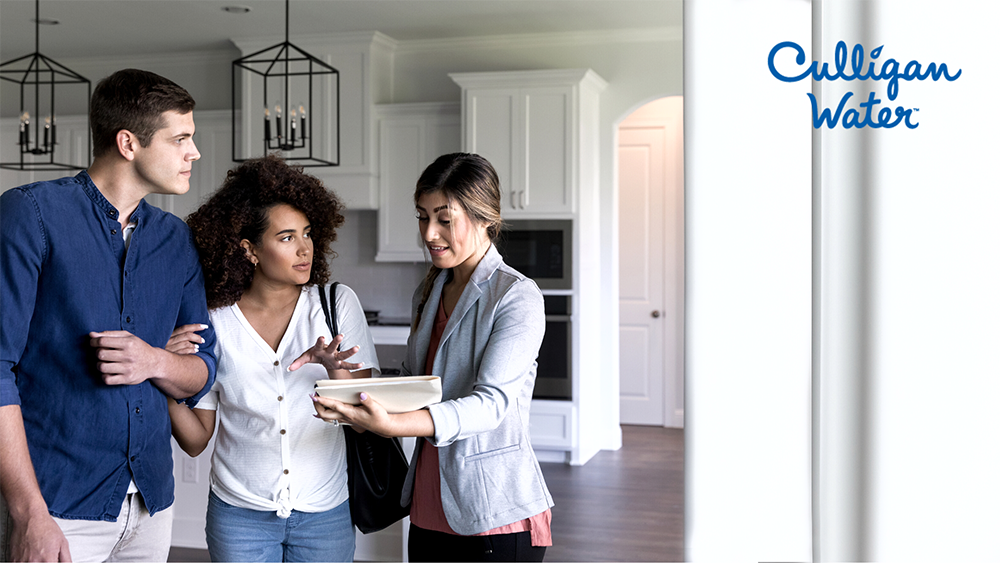Three Water Quality Questions To Ask When Moving Into a New Home
Whether buying a house or signing a rental lease, be sure to ask these three questions about your new home’s water quality.

What’s in your water? Find out with a free water test from your local Culligan water expert.
Free Water Test
When moving into a new home, it’s crucial to know what questions to ask. Common questions include topics like roofing, appliances, neighbors and nearby schools. Water quality is one area that we don’t always think to discuss. However, water plays a huge role in your everyday life.
Bringing your ideal home to life starts with quality water. It’s important to have quality water for drinking, cooking, bathing and cleaning. So, ask these three questions to make sure that there are no unpleasant surprises down the line.
What Is the Source of My New Home’s Water?
Understanding your water starts with the source. Your home’s water will typically fall into two categories: municipal or well water. And both of them may require different types of treatment.
Municipal Water
If your home has a municipal water source, then your water is required to meet prescribed government standards for drinking water quality and safety in the United States and in Canada.
The U.S. Environmental Protection Agency (EPA), for example, sets legal limits for more than 90 contaminants. As such, municipal water typically undergoes treatment at a local water treatment facility. While this regulation makes municipal water quite reliable, there is still room for potential problems.
For starters, not all contaminants are regulated. Such as emerging concerns like the “forever chemicals” PFOA/PFOS in water. Additionally, many cities use chlorine as a disinfectant. While this practice is typically safe, higher levels of chlorine can affect your water’s taste and smell.
Municipal water can also be contaminated after it leaves the treatment plant. Aging or damaged pipes are frequent culprits of contaminated water.
Well Water
Private wells are not regulated by federal agencies. So, if your home has a private well, it’s even more important to look into the quality of your water. Regular well water testing is the homeowner’s responsibility. And so is any necessary water treatment.
Some of the most common aesthetic issues experienced by well water users include:
- High levels of minerals like calcium and magnesium, which cause hard water.
- Iron, which leads to rust stains in sinks, tubs and clothes.
- Hydrogen sulfide, which causes a rotten egg or sulfur smell in water.
These issues are an inconvenience, to be sure. But there are health-related reasons to learn more about your well water, as well. Many worrisome contaminants are invisible to the senses.
Factors contributing to contamination include minerals found naturally in the ground, chemicals from factories and nitrates or fecal matter from farming. Additionally, outdated pipes leave millions of people vulnerable to lead contamination and bacterial growth.*
Is the Area Known for Any Water Issues?
Most water issues are fixable with the right treatment. If there are any pre-established issues, it’s better to seek them out before they make themselves known.
In the U.S., some information about your local water is publicly available through EPA-mandated annual water quality reports. And here are some common water problems you can ask about:
- Hard water: Hard water can cause dry skin and hair, spotting on dishware and mineral buildup in your pipes and appliances.
- Specific contaminants: You can also reference the Water Quality Research Foundation’s Contaminant Occurrence Map to see where certain regulated drinking water contaminants appear.
- Unpleasant odor: Rotten, musty and soapy smells are some of the most frequently reported odor issues.
- Unpalatable taste: Sour, salty, bitter and metallic tastes can signal high levels of total dissolved solids (TDS) in your water.
Are There Any Water Treatment Systems Installed in the Home?
Another important question to ask is whether any water treatment systems are currently installed in the home. Examples include water softeners, whole home filtration systems and reverse osmosis drinking water systems.
If there are systems installed in the home, here are some additional questions to consider:
- When were the systems installed?
- What brands are they?
- How well are they currently working?
- What maintenance do they require?
If you find the current water treatment systems to be lacking, Culligan water can help.
Culligan water Solutions
At Culligan, we want to provide the best water solution for your unique household. So you will always have safe, healthy water to consume.
These are some of our most popular solutions:
- Drinking water: With the Aquasential® Smart Reverse Osmosis Drinking Water System, our drinking water systems reduce common contaminants found in tap water. And they deliver better, healthier water for your whole family to enjoy.
- Softening: The Culligan Aquasential™ High Efficiency Water Softener is a great water softening option. Featuring Aqua-Sensor® technology, it automatically adjusts to any fluctuations in your home’s water conditions.
- Whole home: A Culligan Whole House Water Filter delivers amazing results when it comes to filtering and softening your home’s water. The dual system gets rid of hard water minerals that cause scale buildup. At the same time, it reduces chlorine, sulfur and other contaminants that contribute to bad taste and smell.
All Culligan water systems come with your own personal Culligan water expert.
Next Steps
Be in control of your new home’s water. Culligan offers free water consultations in person, by phone and online.
To learn more about your water quality or to get started with a Culligan water treatment system, contact your local Culligan water expert today.
*Contaminants may not be in your water.
